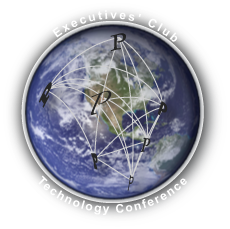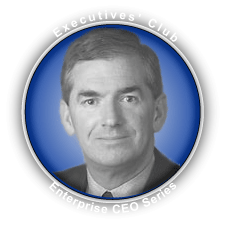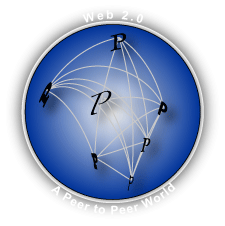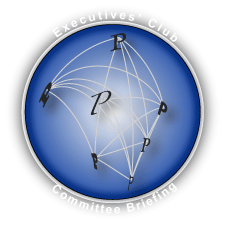Visions for Technology Leadership
 After Gary Forsee’s luncheon address, a diverse panel of executives took the stage to discuss global technology leadership. Hardik Bhatt, CIO of the City of Chicago, Steve Goldman, Director of Architecture, the Chicago Mercantile Exchange, Raymond Spencer, CEO of Kanbay International, and David Weick, Global CIO of McDonald’s, shared their visions for Chicago’s global role in the world. Janet Kennedy, Midwest General Manager of Microsoft, gracefully moderated the panel discussion. The Executives’ Club of Chicago’s quarterly Technology Conference took place March 8 at the Chicago Hilton. After Gary Forsee’s luncheon address, a diverse panel of executives took the stage to discuss global technology leadership. Hardik Bhatt, CIO of the City of Chicago, Steve Goldman, Director of Architecture, the Chicago Mercantile Exchange, Raymond Spencer, CEO of Kanbay International, and David Weick, Global CIO of McDonald’s, shared their visions for Chicago’s global role in the world. Janet Kennedy, Midwest General Manager of Microsoft, gracefully moderated the panel discussion. The Executives’ Club of Chicago’s quarterly Technology Conference took place March 8 at the Chicago Hilton.
“Getting global” can mean many things, and panelists hit the issue from many directions. I’ll venture that, more than anything, it means changing one’s mindset, focus and approach, all of which are difficult to measure. All panelists represented organizations that had had international operations for decades, so how is global different?
[…]
Sprint Nextel’s Destiny and the Demand for a New Wireless Future reports on how Sprint Nextel is betting its future on a new wired society.
 Gary D. Forsee, Chairman and CEO, Sprint Nextel Corporation, set the stage for the Executives’ Club of Chicago’s Technology Conference by outlining Sprint’s wireless strategy and a new vision for global community at the March enterprise CEO luncheon at the Chicago Hilton. Gary D. Forsee, Chairman and CEO, Sprint Nextel Corporation, set the stage for the Executives’ Club of Chicago’s Technology Conference by outlining Sprint’s wireless strategy and a new vision for global community at the March enterprise CEO luncheon at the Chicago Hilton.
Sprint’s long history reflects the transformation of the U.S. telecoms market. The company has had a key role in remaking the U.S. telecoms industry during its privatization. It competed as a competitive local exchange carrier (CLEC) and once earned most of its revenue from long distance services, which are now essentially free. After its 2005 merger with Nextel, virtually all its revenue comes from wireless services.
Moreover, Mr. Forsee promised that Chicago would be one of two pilot cities for Sprint’s WiMAX initiative later this year. Chicagoans will be among the first in the U.S. to try 4G network services.
Sprint’s Wireless Future
Sprint Nextel has seen the future, and it […]
How to Increase Your Payback from Using LinkedIn
 LinkedIn is a “social” site that will prove to be of rare benefit to business executives and professionals in building individualized collaborative networks, as I explained in detail in the GHCJ Review of LinkedIn. However, LinkedIn is seriously lacking in providing a step-by-step guide to help the motivated executive to tap its real value. The functionality of the website is easy to use, but many of the finer points of LinkedIn are lost on the majority of users. This guide attempts to address that. LinkedIn is a “social” site that will prove to be of rare benefit to business executives and professionals in building individualized collaborative networks, as I explained in detail in the GHCJ Review of LinkedIn. However, LinkedIn is seriously lacking in providing a step-by-step guide to help the motivated executive to tap its real value. The functionality of the website is easy to use, but many of the finer points of LinkedIn are lost on the majority of users. This guide attempts to address that.
[…]
Web 2.0 Is Transforming Relationships Between Customers and Companies*
 I’ll risk using a hype-laden term like “Web 2.0” in the title: I think most of us have been around long enough to understand that hype doesn’t mean that nothing is there, although it can distract us from seeing things that we should be watching. I’ll risk using a hype-laden term like “Web 2.0” in the title: I think most of us have been around long enough to understand that hype doesn’t mean that nothing is there, although it can distract us from seeing things that we should be watching.
I have been in the thick of the “adoption curves” of Java, e-business transformation and SOA/Web services (detail). They have been instrumental in creating a new information infrastructure and business process capabilities. “Web 2.0” will prove to be the most transformational so far because it is changing relationships. It changes individuals’ relationships with each other, and it will change how companies and the customers relate to each other. It will demand “Marketing 2.0.”
Tectonic Shift
As I argued in The 3.x Economies, we are transitioning away from the Industrial Economy and entering the Knowledge Economy. In the Industrial Economy, companies created value by manufacturing products efficiently based on their core competencies, and they marketed products to customers. They also created and marketed services on a large scale. “Marketing” grew as a profession during the 20th century when […]
Retrofitting GM, the Quintessential Industrial Economy Enterprise reflects Knowledge Economy disruption as production-focused enterprises languish as customers continue to forsake them.
 As readers of these pages know well, I estimate that one of the most poignant changes that faces Industrial Economy enterprises is shifting their primary focus from production and operations to the customer. The Industrial Economy mechanized work and production, and by any measure it created unprecedented wealth by drastically lowering per-unit costs of any kind of product you can name, bringing more products within the means of more people. This worked extremely well while demand exceeded supply: customers were excited to have their first car/house/television, and they were happy with what producers brought to market. As readers of these pages know well, I estimate that one of the most poignant changes that faces Industrial Economy enterprises is shifting their primary focus from production and operations to the customer. The Industrial Economy mechanized work and production, and by any measure it created unprecedented wealth by drastically lowering per-unit costs of any kind of product you can name, bringing more products within the means of more people. This worked extremely well while demand exceeded supply: customers were excited to have their first car/house/television, and they were happy with what producers brought to market.
However, Industrial Economy CSFs (critical success factors) look extremely stale in the Knowledge Economy (also see Transformation: From Self-contained Company to Networked Global Organization). The e-business revolution has vastly enhanced communications, decreased cycle times and moved the mass customization model closer to reality.
Big Dealer to Detroit: Fix How You Make Cars (The Wall Street Journal, 9 February 2007) spells out the problem extremely well:
“One of the […]
Media Reflects Power Shift away from Producers to Consumers—Glimpses of Consumer Empowerment
 The Executives’ Club of Chicago assembled a visionary panel to give Midwest business leaders their advice for media communications in the (“new” ,^) digital age. Rishad Tobaccowala, CEO, Denuo Group and Chief Innovation Officer, Publicis; Dr. Jim Taylor, Vice Chairman, The Harrison Group and Emily L. Barr, President & General Manager, ABC 7 Chicago were panelists, and Susan D. Whiting, Chairman, Nielsen Media Research moderated the breakfast, which took place 30 January 2007 at Chicago’s Mid-America Club. The Executives’ Club of Chicago assembled a visionary panel to give Midwest business leaders their advice for media communications in the (“new” ,^) digital age. Rishad Tobaccowala, CEO, Denuo Group and Chief Innovation Officer, Publicis; Dr. Jim Taylor, Vice Chairman, The Harrison Group and Emily L. Barr, President & General Manager, ABC 7 Chicago were panelists, and Susan D. Whiting, Chairman, Nielsen Media Research moderated the breakfast, which took place 30 January 2007 at Chicago’s Mid-America Club.
Ours is rapidly becoming a P2P world in which individuals communicate with individuals digitally, and this represents a profound shift for media companies, their clients and everyone’s customers. The focus of the morning discussion was “media”—television, print, radio—which are still largely organized to deliver one message to an audience of many. Of course, the “mass” has always been comprised of individuals, but their alternatives to mass media have been few until fairly recently. Now they are tuning out mass messaging in favor of more relevant communications, which increasingly come from—other individuals. Meantime, people are increasingly connected via the Internet (whether through mobile […]
High Potential for Business Innovation
 Plus ça change* was the theme of The Executives’ Club of Chicago High Technology Conference December eighth, where an esteemed panel gave varying perspectives on Chicago’s importance as a technology center. William Avery of Brunswick Corporation, James O’Connor, Jr. of Motorola, Inc. and Ira H. Cohen of Goldman, Sachs & Co. spoke about technology from enterprise IT, mobile technology and investment points of view respectively. Prior to their prepared remarks, John Gentry of CSC Consulting outlined key results of the forthcoming Chicago Technology Outlook Survey, in which corporate technology leaders commented on IT trends for 2007 as well as Chicago’s role as a technology center. He moderated the panel during a Q&A session. Plus ça change* was the theme of The Executives’ Club of Chicago High Technology Conference December eighth, where an esteemed panel gave varying perspectives on Chicago’s importance as a technology center. William Avery of Brunswick Corporation, James O’Connor, Jr. of Motorola, Inc. and Ira H. Cohen of Goldman, Sachs & Co. spoke about technology from enterprise IT, mobile technology and investment points of view respectively. Prior to their prepared remarks, John Gentry of CSC Consulting outlined key results of the forthcoming Chicago Technology Outlook Survey, in which corporate technology leaders commented on IT trends for 2007 as well as Chicago’s role as a technology center. He moderated the panel during a Q&A session.
The net-net: Chicago has a way to go before it becomes a preeminent technology center; however, its best chance for creating breakaway value through innovation will lie in not focusing on technology, as explained in Analysis and Conclusions.
[…]
|
|
 After Gary Forsee’s luncheon address, a diverse panel of executives took the stage to discuss global technology leadership. Hardik Bhatt, CIO of the City of Chicago, Steve Goldman, Director of Architecture, the Chicago Mercantile Exchange, Raymond Spencer, CEO of Kanbay International, and David Weick, Global CIO of McDonald’s, shared their visions for Chicago’s global role in the world. Janet Kennedy, Midwest General Manager of Microsoft, gracefully moderated the panel discussion. The Executives’ Club of Chicago’s quarterly Technology Conference took place March 8 at the Chicago Hilton.
After Gary Forsee’s luncheon address, a diverse panel of executives took the stage to discuss global technology leadership. Hardik Bhatt, CIO of the City of Chicago, Steve Goldman, Director of Architecture, the Chicago Mercantile Exchange, Raymond Spencer, CEO of Kanbay International, and David Weick, Global CIO of McDonald’s, shared their visions for Chicago’s global role in the world. Janet Kennedy, Midwest General Manager of Microsoft, gracefully moderated the panel discussion. The Executives’ Club of Chicago’s quarterly Technology Conference took place March 8 at the Chicago Hilton.
 Gary D. Forsee, Chairman and CEO, Sprint Nextel Corporation, set the stage for the Executives’ Club of Chicago’s Technology Conference by outlining Sprint’s wireless strategy and a new vision for global community at the March enterprise CEO luncheon at the Chicago Hilton.
Gary D. Forsee, Chairman and CEO, Sprint Nextel Corporation, set the stage for the Executives’ Club of Chicago’s Technology Conference by outlining Sprint’s wireless strategy and a new vision for global community at the March enterprise CEO luncheon at the Chicago Hilton. LinkedIn is a “social” site that will prove to be of rare benefit to business executives and professionals in building individualized collaborative networks, as I explained in detail in the GHCJ Review of LinkedIn. However, LinkedIn is seriously lacking in providing a step-by-step guide to help the motivated executive to tap its real value. The functionality of the website is easy to use, but many of the finer points of LinkedIn are lost on the majority of users. This guide attempts to address that.
LinkedIn is a “social” site that will prove to be of rare benefit to business executives and professionals in building individualized collaborative networks, as I explained in detail in the GHCJ Review of LinkedIn. However, LinkedIn is seriously lacking in providing a step-by-step guide to help the motivated executive to tap its real value. The functionality of the website is easy to use, but many of the finer points of LinkedIn are lost on the majority of users. This guide attempts to address that. I’ll risk using a hype-laden term like “Web 2.0” in the title: I think most of us have been around long enough to understand that hype doesn’t mean that nothing is there, although it can distract us from seeing things that we should be watching.
I’ll risk using a hype-laden term like “Web 2.0” in the title: I think most of us have been around long enough to understand that hype doesn’t mean that nothing is there, although it can distract us from seeing things that we should be watching. As readers of these pages know well, I estimate that one of the most poignant changes that faces Industrial Economy enterprises is shifting their primary focus from production and operations to the customer. The Industrial Economy mechanized work and production, and by any measure it created unprecedented wealth by drastically lowering per-unit costs of any kind of product you can name, bringing more products within the means of more people. This worked extremely well while demand exceeded supply: customers were excited to have their first car/house/television, and they were happy with what producers brought to market.
As readers of these pages know well, I estimate that one of the most poignant changes that faces Industrial Economy enterprises is shifting their primary focus from production and operations to the customer. The Industrial Economy mechanized work and production, and by any measure it created unprecedented wealth by drastically lowering per-unit costs of any kind of product you can name, bringing more products within the means of more people. This worked extremely well while demand exceeded supply: customers were excited to have their first car/house/television, and they were happy with what producers brought to market. The Executives’ Club of Chicago assembled a visionary panel to give Midwest business leaders their advice for media communications in the (“new” ,^) digital age. Rishad Tobaccowala, CEO, Denuo Group and Chief Innovation Officer, Publicis; Dr. Jim Taylor, Vice Chairman, The Harrison Group and Emily L. Barr, President & General Manager, ABC 7 Chicago were panelists, and Susan D. Whiting, Chairman, Nielsen Media Research moderated the breakfast, which took place 30 January 2007 at Chicago’s Mid-America Club.
The Executives’ Club of Chicago assembled a visionary panel to give Midwest business leaders their advice for media communications in the (“new” ,^) digital age. Rishad Tobaccowala, CEO, Denuo Group and Chief Innovation Officer, Publicis; Dr. Jim Taylor, Vice Chairman, The Harrison Group and Emily L. Barr, President & General Manager, ABC 7 Chicago were panelists, and Susan D. Whiting, Chairman, Nielsen Media Research moderated the breakfast, which took place 30 January 2007 at Chicago’s Mid-America Club. Plus ça change* was the theme of The Executives’ Club of Chicago High Technology Conference December eighth, where an esteemed panel gave varying perspectives on Chicago’s importance as a technology center. William Avery of Brunswick Corporation, James O’Connor, Jr. of Motorola, Inc. and Ira H. Cohen of Goldman, Sachs & Co. spoke about technology from enterprise IT, mobile technology and investment points of view respectively. Prior to their prepared remarks, John Gentry of CSC Consulting outlined key results of the forthcoming Chicago Technology Outlook Survey, in which corporate technology leaders commented on IT trends for 2007 as well as Chicago’s role as a technology center. He moderated the panel during a Q&A session.
Plus ça change* was the theme of The Executives’ Club of Chicago High Technology Conference December eighth, where an esteemed panel gave varying perspectives on Chicago’s importance as a technology center. William Avery of Brunswick Corporation, James O’Connor, Jr. of Motorola, Inc. and Ira H. Cohen of Goldman, Sachs & Co. spoke about technology from enterprise IT, mobile technology and investment points of view respectively. Prior to their prepared remarks, John Gentry of CSC Consulting outlined key results of the forthcoming Chicago Technology Outlook Survey, in which corporate technology leaders commented on IT trends for 2007 as well as Chicago’s role as a technology center. He moderated the panel during a Q&A session.